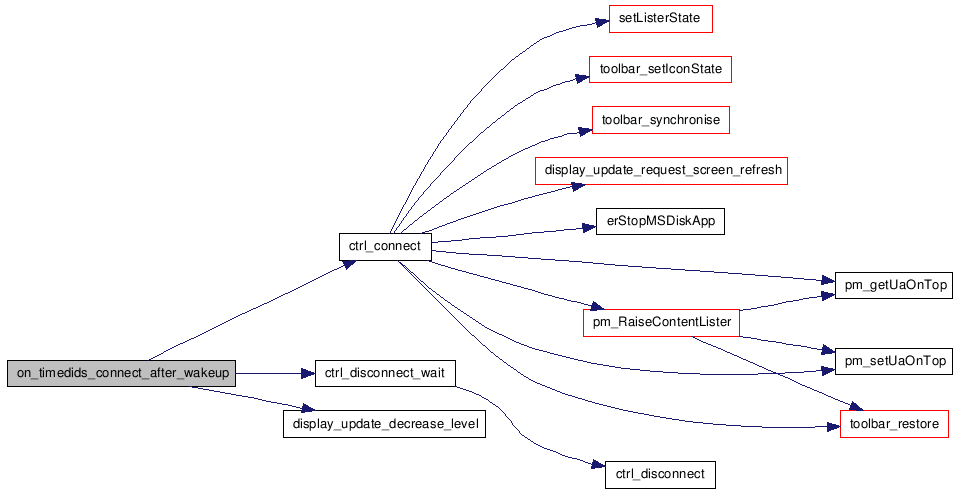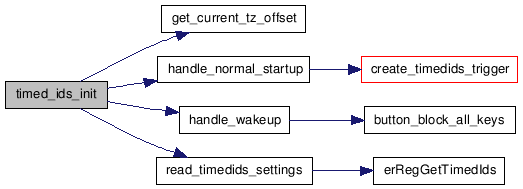contentLister/inc/timedids.h File Reference
control - handle timed-iDS connection More...
This graph shows which files directly or indirectly include this file:

Go to the source code of this file.
Classes | |
| struct | tzhead |
Defines | |
| #define | TZ_FILE "/etc/localtime" |
Enumerations | |
| enum | timedids_connect_reason { connect_after_wakeup, connect_when_running, connect_undefined } |
Functions | |
| void | timed_ids_init () |
| void | timed_ids_final () |
| gboolean | on_timedids_connect_after_wakeup (gpointer p) |
| void | timed_ids_handle_connmgr_quit () |
| void | timed_ids_handle_reread_settings () |
| void | timed_ids_handle_recreate_timer (gint interval) |
| timedids_connect_reason | get_timedids_connect_reason () |
| void | set_timedids_connect_reason (timedids_connect_reason connReason) |
Detailed Description
control - handle timed-iDS connection<File description>="">
Definition in file timedids.h.
Define Documentation
| #define TZ_FILE "/etc/localtime" |
Definition at line 33 of file timedids.h.
Enumeration Type Documentation
Definition at line 35 of file timedids.h.
00036 { 00037 connect_after_wakeup, 00038 connect_when_running, 00039 connect_undefined 00040 }timedids_connect_reason;
Function Documentation
| timedids_connect_reason get_timedids_connect_reason | ( | ) |
| gboolean on_timedids_connect_after_wakeup | ( | gpointer | p | ) |
Definition at line 146 of file timedids.c.
00147 { 00148 CL_LOGPRINTF("entry"); 00149 00150 // Launch connectionMgr to download contents (include software updates if needed) 00151 ctrl_disconnect_wait(); 00152 if (g_timedids_settings->swUpdate) 00153 { 00154 ctrl_connect(connectScrDownloadHistory, connect_timed_ids_with_sw); 00155 } 00156 else 00157 { 00158 ctrl_connect(connectScrDownloadHistory, connect_timed_ids_content_only); 00159 } 00160 00161 display_update_decrease_level(LISTER_EXPOSE_LEVEL); 00162 00163 return FALSE; 00164 }
Here is the call graph for this function:

| void set_timedids_connect_reason | ( | timedids_connect_reason | connReason | ) |
| void timed_ids_final | ( | ) |
Definition at line 304 of file timedids.c.
00305 { 00306 CL_LOGPRINTF("entry"); 00307 00308 if (g_timedids_settings->enable) 00309 { 00310 // Re-create RTC alarm interrupt 00311 time_t utc_second = time(NULL); 00312 int local_second = (utc_second + g_current_tzoffset) % SECONDS_OF_DAY; 00313 00314 int i; 00315 for(i=0; i<g_timedids_settings->timeCnt; i++) 00316 { 00317 if (g_timedids_settings->timeSet[i] > local_second) 00318 { 00319 break; 00320 } 00321 } 00322 00323 if (i == g_timedids_settings->timeCnt) 00324 { 00325 i = 0; 00326 } 00327 00328 int utc_alarm = g_timedids_settings->timeSet[i] - g_current_tzoffset; 00329 if (utc_alarm < 0) 00330 { 00331 utc_alarm += SECONDS_OF_DAY; 00332 } 00333 else if (utc_alarm > SECONDS_OF_DAY) 00334 { 00335 utc_alarm -= SECONDS_OF_DAY; 00336 } 00337 00338 struct rtc_time rtc_tm; 00339 memset(&rtc_tm, 0, sizeof(struct rtc_time)); 00340 rtc_tm.tm_hour = utc_alarm / 3600; 00341 rtc_tm.tm_min = utc_alarm / 60 % 60; 00342 rtc_tm.tm_sec = utc_alarm % 60; 00343 00344 // Open device 00345 int rtc, ret; 00346 rtc = open ("/dev/rtc", O_RDWR); 00347 if (rtc == -1) 00348 { 00349 CL_ERRORPRINTF("Can NOT open /dev/rtc"); 00350 return; 00351 } 00352 00353 // Re-set RTC alarm to the next timeset in registry 00354 ret = ioctl(rtc, RTC_ALM_SET, &rtc_tm); 00355 if (ret == -1) 00356 { 00357 CL_ERRORPRINTF("Can NOT set RTC alarm"); 00358 return; 00359 } 00360 00361 CL_WARNPRINTF("RTC Alarm is set to %02d:%02d:%02d\n", rtc_tm.tm_hour, rtc_tm.tm_min, rtc_tm.tm_sec); 00362 00363 // Re-enable RTC alarm interrupt 00364 ret = ioctl(rtc, RTC_AIE_ON, 0); 00365 if (ret == -1) 00366 { 00367 CL_ERRORPRINTF("Can NOT enable RTC alarm interrupt"); 00368 return; 00369 } 00370 00371 close(rtc); 00372 } 00373 00374 erRegFreeTimedIds(g_timedids_settings); 00375 }
Here is the call graph for this function:

| void timed_ids_handle_connmgr_quit | ( | ) |
Definition at line 230 of file timedids.c.
00231 { 00232 CL_LOGPRINTF("entry"); 00233 switch (g_connect_reason) 00234 { 00235 case connect_after_wakeup: 00236 if (g_timedids_settings->switchOff) 00237 { 00238 // Shut down iLiad, and also create RTC alarm for the next trigger point 00239 ctrl_shutdown(); 00240 } 00241 else 00242 { 00243 create_timedids_trigger(); 00244 00245 button_block_all_keys(FALSE); 00246 } 00247 break; 00248 case connect_when_running: 00249 // Create time-out event for the next trigger point 00250 create_timedids_trigger(); 00251 break; 00252 default: 00253 break; 00254 } 00255 }
Here is the call graph for this function:

| void timed_ids_handle_recreate_timer | ( | gint | interval | ) |
Definition at line 218 of file timedids.c.
00219 { 00220 if (g_timeout_source_id > 0) 00221 { 00222 g_source_remove(g_timeout_source_id); 00223 g_timeout_source_id = 0; 00224 } 00225 00226 g_timeout_source_id = g_timeout_add(interval * 60 * 1000, 00227 on_idle_connect_start_background, (gpointer)connect_timed_ids_background); 00228 }
Here is the call graph for this function:

| void timed_ids_handle_reread_settings | ( | ) |
Definition at line 257 of file timedids.c.
00258 { 00259 CL_LOGPRINTF("entry"); 00260 00261 // Re-read timed-iDS connection settings 00262 regTimedIds_t* stored_timedids_settings = NULL; 00263 if ((stored_timedids_settings = read_timedids_settings()) == NULL) 00264 { 00265 CL_ERRORPRINTF("Can NOT read timed-iDS connection settings"); 00266 return; 00267 } 00268 00269 int new_tzoffset = get_current_tz_offset(); 00270 gboolean settings_changed = FALSE; 00271 00272 if (memcmp(stored_timedids_settings, g_timedids_settings, sizeof(regTimedIds_t)) != 0) 00273 { 00274 // User changed timed-iDS connection settings 00275 *g_timedids_settings = *stored_timedids_settings; 00276 settings_changed = TRUE; 00277 } 00278 if (new_tzoffset != g_current_tzoffset) 00279 { 00280 // User changed timezone 00281 g_current_tzoffset = new_tzoffset; 00282 settings_changed = TRUE; 00283 } 00284 00285 if (settings_changed) 00286 { 00287 // First, remove current time-out trigger 00288 if (g_timeout_source_id > 0) 00289 { 00290 g_source_remove(g_timeout_source_id); 00291 g_timeout_source_id = 0; 00292 } 00293 00294 // Second, re-create time-out trigger if timed-iDS enabled 00295 if (g_timedids_settings->enable) 00296 { 00297 create_timedids_trigger(); 00298 } 00299 } 00300 00301 erRegFreeTimedIds(stored_timedids_settings); 00302 }
Here is the call graph for this function:

| void timed_ids_init | ( | ) |
Definition at line 85 of file timedids.c.
00086 { 00087 CL_LOGPRINTF("entry"); 00088 00089 // Check if we are waken up by RTC alarm interrupt or not 00090 // Get settings from registry 00091 if ((g_timedids_settings = read_timedids_settings()) == NULL) 00092 { 00093 CL_ERRORPRINTF("Can NOT read timed-iDS connection settings"); 00094 return; 00095 } 00096 00097 // Get current timezone offset 00098 g_current_tzoffset = get_current_tz_offset(); 00099 00100 if (!g_timedids_settings->enable) 00101 { 00102 // Nothing to do 00103 return; 00104 } 00105 00106 time_t utc_second = time(NULL); 00107 struct tm* tm_local = localtime(&utc_second); 00108 int local_second = tm_local->tm_hour * 3600 + tm_local->tm_min * 60 + tm_local->tm_sec; 00109 00110 gboolean wakeup_by_alarm = FALSE; 00111 int i; 00112 for (i=0; i<g_timedids_settings->timeCnt; i++) 00113 { 00114 // If current time is <90 seconds later than 1 alarm time, 00115 // then we think we are being waken up by alarm interrupt 00116 if (local_second > g_timedids_settings->timeSet[i] && 00117 local_second - g_timedids_settings->timeSet[i] <= 90) 00118 { 00119 wakeup_by_alarm = TRUE; 00120 break; 00121 } 00122 } 00123 00124 if (wakeup_by_alarm) 00125 { 00126 // The iLiad is waken up by RTC alarm interrupt 00127 handle_wakeup(); 00128 } 00129 else 00130 { 00131 // Normal startup 00132 handle_normal_startup(); 00133 } 00134 }
Here is the call graph for this function:

 1.5.6
1.5.6